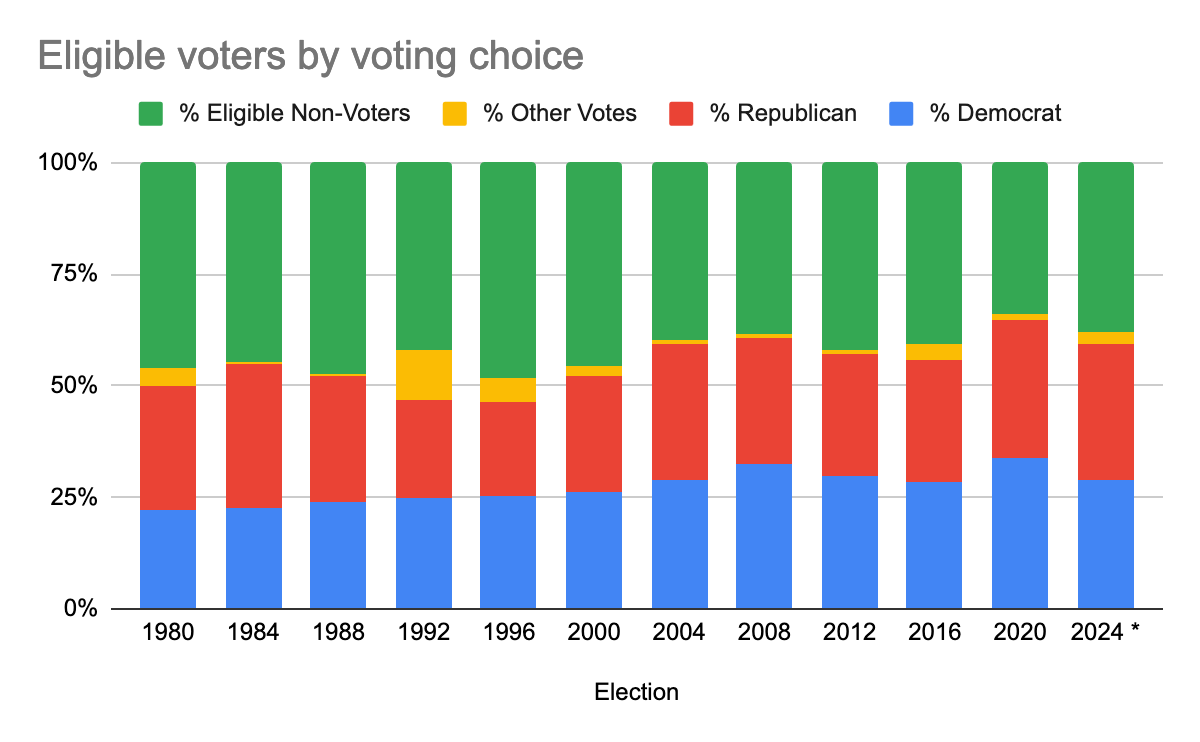More eligible voters don't vote than vote for either US party
Our media typically cover elections by zooming in on people who vote, treating this as the "100%" of which other vote counts are proportions.
But it's worth remembering that if you include everyone who is eligible to vote, the most popular "party" in every US presidential election since 1980 (and probably ever) is "didn't vote".

Conventional wisdom is that candidates should focus on likely voters—they're the ones who are likely to vote, after all. This turns into the familiar fight to win over "independents" in swing states. But total turnout in this period spanned from 51.7% (1996) to 65.9% (2020), a 14.2 percentage-point range! Could this group of "maybe won't vote" voters be a better pool of people to go after?
Now, turnout overall has gone up over this period, so 14 points is way overstating year to year swings. We can get a better estimate with a little stats. If you use this data without the still incomplete 2024 data point, a linear regression shows that turnout has been steadily increasing over time during this period by nearly 1 percentage-point every 4 years (p < .01). If you measure just deviation from this trend each year, that has a standard deviation of 2.8 percentage points. This is probably a better measure of how much turnout varies year to year. So roughly speaking the year-to-year variation is larger than most elections' margins of victory.
This is highly suggestive. Turnout isn't constant but changes enough year to year to potentially affect election outcomes. If a party could draw in more of these eligible non-voters, and keep them engaged and voting, that could significantly up their chances of winning elections. What would a campaign look like that took seriously the proposition that disengaged potential voters are the low-hanging fruit for winning races? That making enthusiastic people repeat your message to their friends, rather than bending over backwards to peel off votes from the other party, is the key to winning elections? (Something like this was the theme of a chapter covering Anat Shenker-Osorio's messaging philosophy in the book The Persuaders by Anand Giridharadas, worth reading if you're interested.)
Imagine focus groups that asked disengaged non-voters why they don't vote. What are both parties not offering them? What obvious gaping problems have they seen persist Republican after Democrat after Republican after Democrat? What would it take to make paying attention, registering to vote, making a voting plan, and voting worth it to them?
My guess is that most of these people are just tired of what they see as smiling faces and empty promises, fair or not. Regardless of the party in power, people open their news feeds to American bombs killing children by the thousands. A widening gap between elites and regular people. Cost of living issues that hit already-struggling people hardest. Companies that pay them too little and charge them too much. Increasing isolation and deterioration of community. Rising homelessness. A gummed up and unaccountable criminal justice system that treats you better if you're rich and guilty than if you're poor and innocent. Routine state harassment, jailing, and imprisonment breaking up communities and families. Employment policy that pits them against immigrants. Underfunded schools. These are just some guesses. We can't really know unless we ask this group of people specifically. They probably fall into a few categories. But as far as I can tell, it's not a group that is regularly asked for their input.
And I get it. Why bother if they're not going to vote? But again, some of them are occasional voters, people who vote if they feel like something good is on offer. Either party that could draw in 10% of them (increasing turnout by 3-4 percentage points) would have a huge electoral advantage. Maybe it's too hard—what do I know. Such a party would have to be prepared to abandon longstanding messaging patterns that they're attached to if those aren't resonating, and will have to be prepared to change its goals, perhaps radically, and perhaps in ways that make their rich donor base uncomfortable.
But if the current strategy's not working and no one can agree why, then maybe it's worth a shot.
